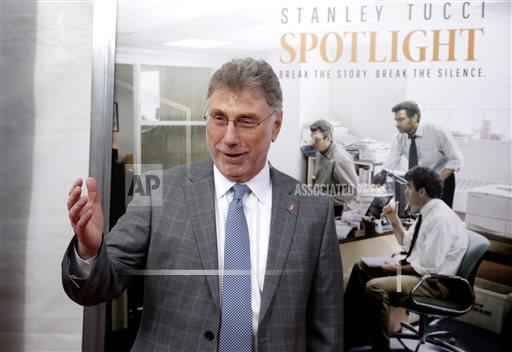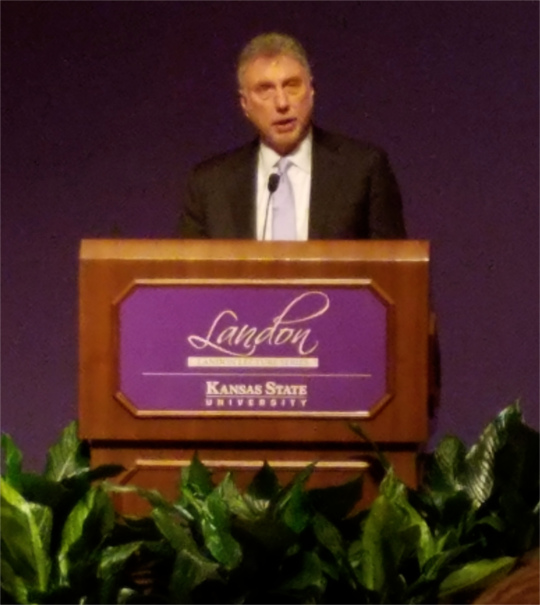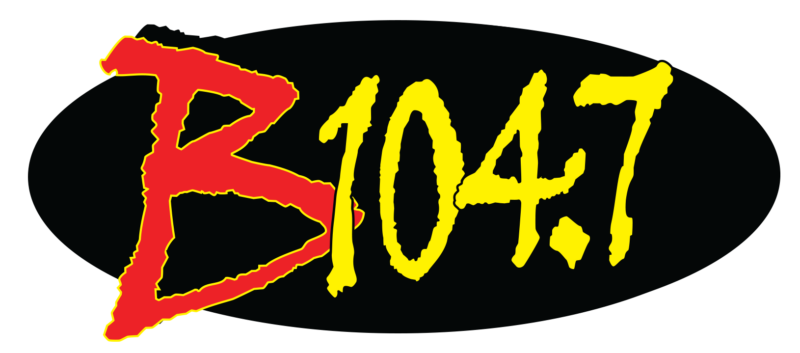
Marty Baron, former editor of The Boston Globe, walks the red carpet as he attends the Boston area premiere of the film “Spotlight” at the Coolidge Corner Theatre, in Brookline, Mass., on Oct. 28, 2015. The film that tells the story of how The Boston Globe reported on the clergy sex abuse scandal. (AP Photo/Steven Senne)
The executive editor of the Washington Post put the state of journalism in the spotlight Thursday morning.
Martin “Marty” Baron, who is best known as the man who led the Boston Globe in its investigation of the sexual abuse of children by Catholic priests in the early 2000s, spoke to a filled and supportive Forum Hall inside the K-State Student Union as a part of its Landon Lecture series.
Baron — who was portrayed by actor Liev Schreiber in the 2015 Oscar-winning film “Spotlight” — focused on journalism in the age of Trump.

Marty Baron, the executive editor of the Washington Post, speaks at Forum Hall in the K-State Student Union Thursday during the 176th Landon Lecture. (Staff photo by Brady Bauman)
“I’m going to get right into it. I’d like to begin by discussing a statement by the President of the United States,” Baron said to laughter after thanking KSU for the invitation in his opening remarks. “Why waste time?”
“In February, the president declared that people like me were the enemy of the American people,” he continued. “Not just me, of course, but the major news media overall, or the ‘fake news’ media, as he likes to call us.”
Baron said such statements do not describe reporters he’s known and lost — especially those who’ve been killed covering conflicts abroad.
“When the president made that statement, I had some immediate thoughts,” he said. “Like so many of my professional colleagues, I thought first of the journalists who had risked their lives to inform the American public — journalists who were eye witnesses to the world’s most dangerous conflicts. I thought of the journalists who didn’t just risk their lives, but lost them.
“And most immediately, I thought of May 9, 2003, when I, as editor of the Boston Globe, had to inform our newsroom of the death of Elizabeth Neuffer. She was 46.
“Elizabeth had died covering the war in Iraq. Her driver was moving at a high speed — a necessity when there was heightened risk of abductions. The driver lost control. Elizabeth was killed. So was her translator, Waleed Khalifa Hassan al-Dulami, 31.”
The Washington Post has been one of the Trump administration’s favorite targets — most notably after Feb. 9, when the Post broke news that Michael Flynn, Trump’s national security adviser at the time, failed to disclose private discussions about U.S. sanctions with a Russian ambassador a month before Trump’s inauguration.
Baron said the administration’s reaction to the story was similar to how it has responded to others of such nature: an outcry for an investigation into illegal leaks while at the same time saying the story was fake and unfounded.
“So here’s a question,” Baron said. “If the president really believes we had no sources for our story, then what exactly needs investigating? By his own reasoning, there would’ve been no leak.
“This is head-spinning stuff.”
Five days after the Post’s story on Flynn, news broke of his resignation — though Trump later said on Feb. 16 that he fired him.
But Baron was sure to say hostilities between the press and the presidency are not new.
“One of my predecessors as executive editor of the Washington Post, Len Downie, released a report more then three years ago on behalf of the Committee to Protect Journalists,” Baron said. “It excoriated then-President Obama for an erosion of press freedoms and government transparency.”
Baron also spoke of the importance of local journalism and championed the work of reporters who are often the only citizens in attendance of city and county commissions.
Baron fought against the “cartoonish stereotype” of journalists being “elitists.” He went through the backgrounds of many journalists on his staff and their diverse origins. One reporter, he said, comes from a dairy farm in western Pennsylvania. Another came to the Post after many tours in the Middle East as a member of the U.S. military.
The work of reporters, he said, is an important function of the First Amendment, and that he took notice when Trump told the CIA shortly after his inauguration that he was at war with the media.
“The president may be at war, but the Washington Post is not,” Baron said. “We’re at work. We’re just trying to do our jobs.”
The post Washington Post editor talks Trump, state of journalism in Landon Lecture appeared first on News Radio KMAN.

